In the wake of a world-wide pet population problem, breed-specific legislation (or BSL) renders thousands more dogs – who’d make perfectly suitable pets – homeless and on death row.
Pit Bulls are banned in several Canadian cities, and are completely outlawed in the province of Ontario. Last December Montréal (in the province of Québec) was added to the list as another law went into effect that outlaws “Pit Bull-type” dogs in the city. People are no longer allowed to adopt these breeds, but there are some loopholes for current Pittie owners – albeit tricky ones.

According to CTV News, the Pitties must be equipped with a muzzle and short leash while in public, “and can only be cared for by an adult.” They must have state-issued ID tags, and owners must also pay a pricey registration fee of $150 annually.
When the bill went into effect, some Pittie owners chose to surrender their pups rather than deal with the hassle. And naturally, the dogs who found themselves in the city shelter were all but doomed. If no one was “allowed” to adopt these dogs, what was there to do besides euthanize them?
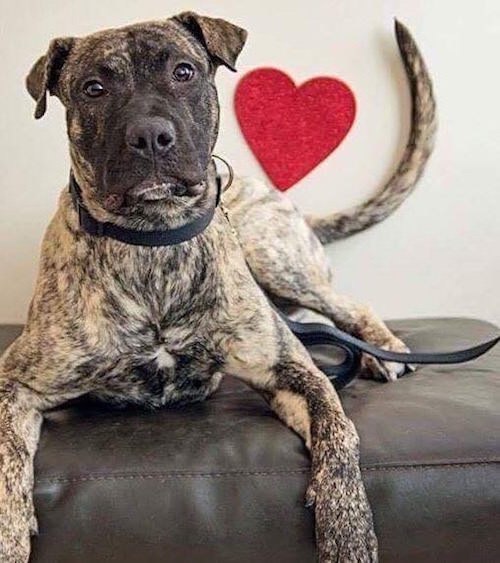
Luckily, there are hundreds of Pit Bull advocates around Montréal and throughout Canada that refused to accept this fate for the dogs being discriminated against. Since they could no longer find forever homes with local families, “restricted” dog breeds found hope in volunteers willing to transfer them across city lines, highways, and back roads, to areas where they were allowed to live.
Two of these dedicated advocates are Joanne Wafer and Shelley Prendergast, who volunteer with Freedom Drivers. The group organizes the ground transport of dogs at risk of euthanasia, including Pit Bulls in Montréal who suddenly found themselves in grave danger.
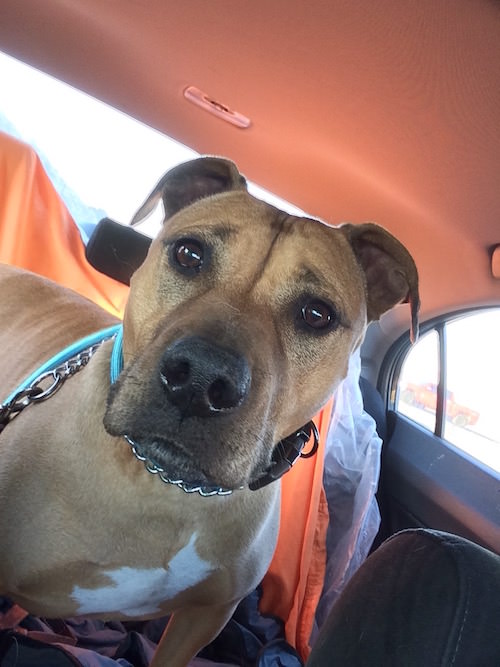
Wafer, the Maritime coordinator with Freedom Drivers, explained to iHeartDogs:
“We transport animals in Québec, Ontario and the Maritimes. Our organisation is fully volunteer run. From the coordinators to the drivers – everything is volunteer.
We started getting involved with the Maritime transports once BSL talks began in Montréal. We work with networking groups such as One Last Chance and Pound Paws, as well as certain shelters. They find rescue placements for the dogs and then Freedom Drivers receive the call for transport. We transport dogs from high-kill and high-volume pounds, as well as owner surrenders.”
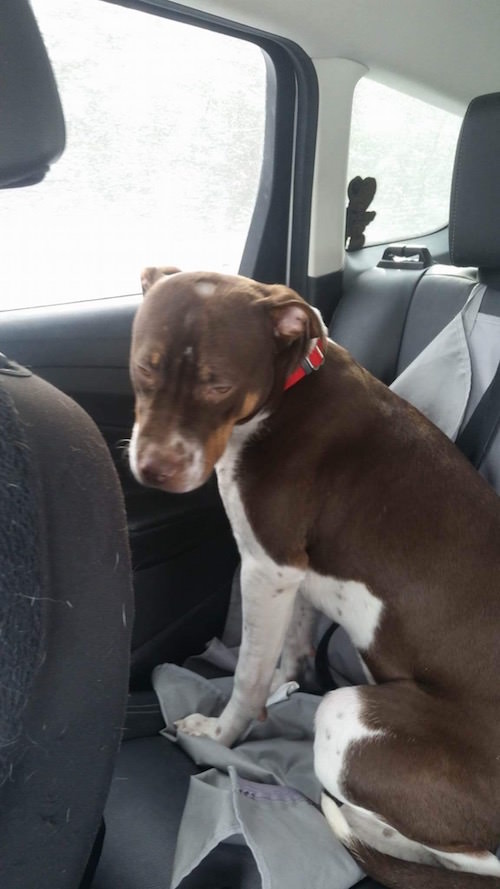
Prendergast, who’s a driver with the organization, told us a little about her personal experience:
“In addition to these particular BSL refugees, my fellow volunteers and I have also transported 2 meat dogs from China (rescued via Humane Society International) and 6 other various breeds saved from their kill shelters.
Dedicated volunteers travel through all kinds of weather, darkness, accidents and wild life mishaps to get these dogs to safety and life.”
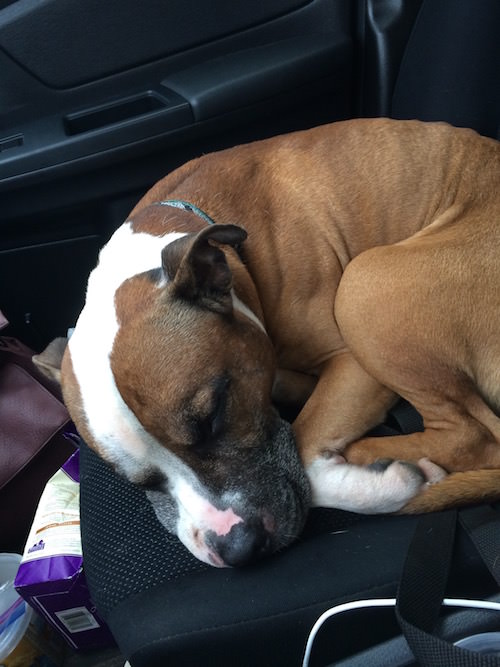
Prendergast is passionate about raising awareness around this unconventional way to volunteer. You don’t need to be rich, and you don’t need to sacrifice your freedom to save a life; all you need is a car and a little bit of time. She said:
“I try to tell as many people as I can about my runs not because I want people to say something nice to me but rather in the huge hope that someone else goes, ‘Hey that’s cool, I should do that!’ THAT is my sole purpose to tell people about this volunteer job.
If only one person sees a post and volunteers only one single time ever, that might make the complete difference between a rescue run going ahead or being cancelled due to lack of drivers! Even if they only ever do one trip, it’s still one life saved and therefore its important and matters a great deal!”
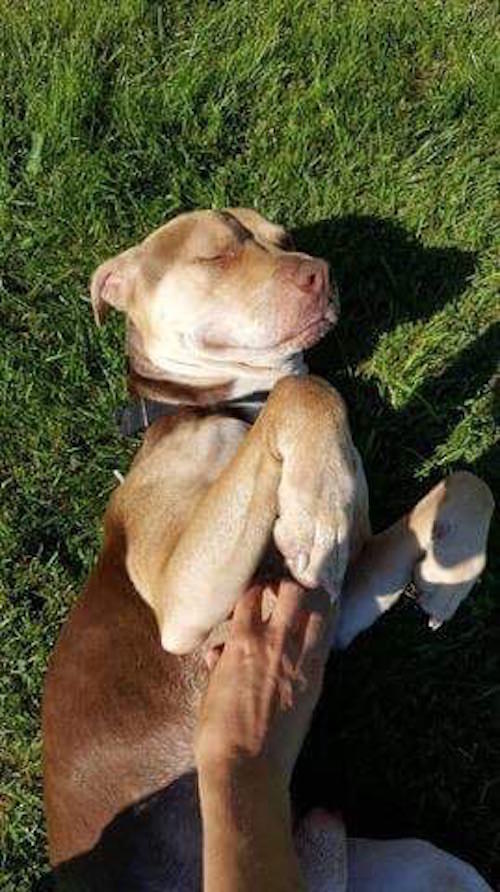
Despite evidence and outcries against BSL, it could get worse for Canadian families with Pit Bulls. A bill passed in April to ban the breeds across the entire province of Québec. Dogs at risk include: “American Staffordshire Terriers, Staffordshire Bull Terriers, American Pit Bull Terriers, Rottweilers, and any dog resulting from a mix of these breeds.” This law could lead to the death of thousands of healthy, friendly, but homeless dogs. (If you’re against this becoming a law, sign this petition.)
“I own a pit bull from my local SPCA and the biggest thing he has taught me is he’s just a dog who needed a home like any other dog,” Prendergast said.
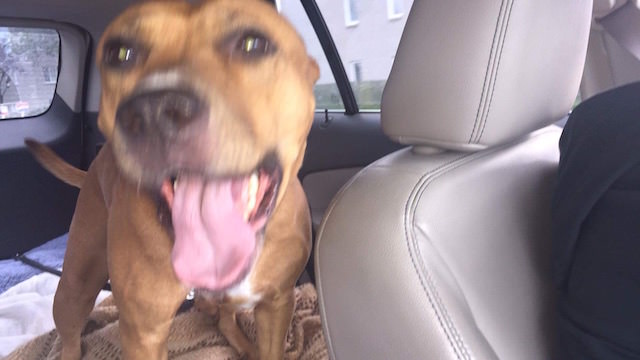
Animal transport is a simple, yet under-utilized (and often, under-supported) solution to saving the lives of thousands of shelter pets. That’s why iHeartDogs began the Second Chance Movement in the U.S., which funds the transport of homeless animals from high-kill shelters to facilities where there’s more space and demand for adoption.
If you want to get involved, there are several simple things you can do:
- Seek out a local transport organization, or start your own.
- If you’re near Québec, Ontario or the Maritimes, volunteer for Freedom Drivers by contacting them via Facebook or email: thefreedomdrivers@gmail.com.
- Donate to one of the Freedom Drivers’ affiliated rescues, or to one near you.
- Purchase Second Chance Movement items from the iHeartDogs store to support transports in the U.S.
- Sign this petition against the bill to pass BSL across Québec.
- Share this story to raise awareness!
Special thanks to Joanne Wafer and Shelley Prendergast for sharing their stories and providing us with valuable information. Another special note: every photo in this piece is of a dog who was rescued by the Freedom Drivers.
